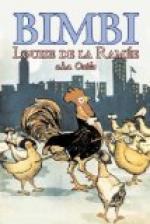Maestro Benedetto had four apprentices or pupils in that time learning to become figuli, but the one whom Raffaelle liked the most (and Pacifica too) was one Luca Torelli, of a village above in the mountains,—a youth with a noble, dark, pensive beauty of his own, and a fearless gait, and a supple, tall, slender figure that would have looked well in the light coat of mail and silken doublet of a man-at-arms. In sooth, the spirit of Messer Luca was more made for war and its risks and glories than for the wheel and the brush of the bottega; but he had loved Pacifica ever since he had come down one careless holy-day into Urbino, and had bound himself to her father’s service in a heedless moment of eagerness to breathe the same air and dwell under the same roof as she did. He had gained little for his pains: to see her at mass and at mealtimes, now and then to be allowed to bring water from the well for her or feed her pigeons, to see her gray gown go down between the orchard trees and catch the sunlight, to hear the hum of her spinning wheel, the thrum of her viol—this was the uttermost he got of joy in two long years; and how he envied Raffaelle running along the stone floor of the loggia to leap into her arms, to hang upon her skirts, to pick the summer fruit with her, and sort with her the autumn herbs for drying!
“I love Pacifica!” he would say, with a groan, to Raffaelle; and Raffaelle would say, with a smile, “Ah, Luca, so do I!”
“It is not the same thing, my dear,” sighed Luca; “I want her for my wife.”
“I shall have no wife; I shall marry myself to painting,” said Raffaelle, with a little grave, wise face looking out from under the golden roof of his fair hair. For he was never tired of watching his father painting the saints with their branch of palm on their ground of blue or of gold, or Maestro Benedetto making the dull clay glow with angels’ wings and prophets’ robes and holy legends told in color.
Now, one day, as Raffaelle was standing and looking thus at his favorite window in the potter’s house, his friend, the handsome, black-browed Luca, who was also standing there, did sigh so deeply and so deplorably that the child was startled from his dreams.
“Good Luca, what ails you?” he murmured, winding his arms about the young man’s knees.
“Oh, ’Faello!” mourned the apprentice, woefully. “Here is such a chance to win the hand of Pacifica if only I had talent—such talent as that Giorgio of Gubbio has! If the good Lord had only gifted me with a master’s skill, instead of all this bodily strength and sinew, like a wild hog of the woods, which avails me nothing here!”
“What chance is it?” asked Raffaelle, “and what is there new about Pacifica? She told me nothing, and I was with her an hour.”




